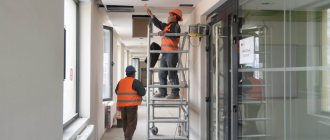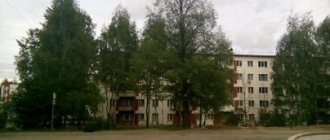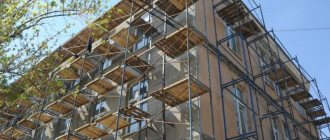Author of the article:
Muzyko Tatyana Andreevna - lawyer.
Payment for major repairs of the common property of an apartment building is an obligation assigned to the owners.
As a standard, funds are transferred to the regional Fund. If an apartment building is managed by a homeowners association, residents take a greater part in organizing major repairs. But in any case it will not be possible to eliminate material costs.
Legislation
Part 1 of Article 169 of the Housing Code of the Russian Federation obliges owners to pay contributions to a specialized organization.
Part 2 of Article 169 G records cases when owners are exempt from paying assessments.
Dear readers! To solve your problem right now, get a free consultation
— contact the lawyer on duty in the online chat on the right or call: +7 (499) 938 6124 — Moscow and region.
+7 (812) 425 6761 — St. Petersburg and region. 8 (800) 350 8362 - Other regions of the Russian Federation You will not need to waste your time and nerves
- an experienced lawyer will solve all your problems!
The article also contains information that regional authorities can, by their resolution, determine the categories of beneficiaries who will partially participate in fundraising.
Paragraph 8 of Article 170 of the Housing Code of the Russian Federation stipulates that owners have the right to suspend the collection of funds when a minimum amount has accumulated in a special account. Only if the owners of premises in an apartment building, as a method of forming a capital repair fund, chose to form it on a special account, and not from a regional operator.
The entry into force of the Federal Law of December 25, 2012 No. 271-FZ “On Amendments to the Housing Code of the Russian Federation” established the rules for carrying out major repair work in residential apartment buildings. At the same time, it acts not as an independent legislative act, but as a kind of annex to the Housing Code of the Russian Federation, clarifying its postulates.
How to write an application for waiver of repair fees
In order to take advantage of the established preferences, you must contact TSN or the management company in order to identify the organization on whose balance sheet the home repairs are carried out. And already there it will be possible to clarify all the nuances of providing benefits and submit a corresponding request with a package of documents attached to it.
Sample document
Submission of papers is necessarily accompanied by writing an application, which is the following form:
Step-by-step application procedure
The first thing you need to do before contacting the regional office or capital repair fund is to find out from the housing and communal services department whether you have a debt. If there is one, you must make a payment, after which you can go to the social security authorities to confirm your preferential status.
In the latter case, you will have to provide certain papers: a passport, receipts for payment of services for the previous period, income certificates in the form of personal income tax (relevant for non-working citizens), an extract from the house, documents confirming property or social rent (for the poor), personal account and application modeled after a local organization.
This also necessarily includes a document confirming the applicant’s preferential status, be it disability, veteran’s or pension certificate, etc. It is worth noting that today it is possible to submit documents in electronic format through the State Services website or the “My Documents” office application.
In addition, in case of physical illness, his authorized representative can apply for benefits for the owner, for which he will have to issue a notarized power of attorney.
It is important to remember that the reason for refusing to pay for major repair services can be not only a preferential status confirmed by documents, but also:
- forced advance payment of services before they are provided;
- lack of decision-making on financing and distribution of funds at general meetings of TSN;
- lack of registration of common property in the form of property;
- lack of a formal contract with the conditions specified in it for receiving the services provided;
- desire to pay for services upon their provision.
And again, it is worth recalling that all of the listed factors are not a legal basis for unilateral failure to fulfill one’s own obligations.
To apply for a benefit, you need to make sure that there are no debts on contributions, collect the necessary package of documents, including certificates confirming the applicant’s preferential status, and contact the organization on whose balance your house is located
Lawyers' answers to the most frequently asked questions
Am I obliged to pay for the replacement of the risers of the centralized heating system if I changed everything in my apartment at my own expense?
Carrying out repairs to your own living space is not a reason to refuse contributions for major repairs of common property, which includes heating risers. Payment of contributions is made in accordance with Art. 170 of the Housing Code of the Russian Federation based on the share of ownership in an apartment building and the amount of contributions established for it.
Tell me, why should I pay a monthly fee for the overhaul of a dilapidated house that is not being repaired and, most likely, will not be repaired?
You shouldn’t, and you have every right to refuse this expense item by first submitting the appropriate application to the organization on whose balance sheet your home is located.
This year I turned 80 years old, I have a group II disability. Can we relieve ourselves of the burden of paying for major home repairs if my working daughter and son-in-law live with me?
Unfortunately, you cannot take advantage of the benefit, since payment for major repairs is carried out based on your living space, on the territory of which there live people who are not eligible for subsidies under this expense item.
What happens if you don't pay
All usual penalties are applied to the debtor. First of all, penalties begin to accrue. If the debt grows to several thousand, the service provider may go to court. This threatens the seizure of bank accounts, as well as forced write-off (by the way, completely legal) from salary or pension cards.
If the debt exceeds 30 thousand rubles, the debtor may be prohibited from leaving the country. In addition, bailiffs have the right to seize property, including a car, if there is one.
Even if the debt arose as a result of erroneous calculations and charges, you cannot simply ignore it - you should contact the organization that issued the invoice and sort it out. If the problem is not resolved on the spot, complain to the State Housing Inspectorate, or, as a last resort, file a lawsuit.
All usual collection measures are applied to the debtor. First of all, penalties begin to accrue. If the debt grows to several thousand, the service provider may go to court. This threatens the seizure of bank accounts, as well as forced debiting of funds from salary and pension cards
Some categories of owners are entitled to benefits for paying for repairs to an apartment building. But in order to receive it, you must prepare the documents correctly. Otherwise, if a debt arises, he may face a trial with not the most rosy prospects.
Is it legal to not pay?
Owners of meters in apartment buildings are required to make payments monthly based on receipts received. The money is accepted by a specialized regional operator, who will subsequently transfer it to contractors. Or at the expense of major repairs of your home, the funds of which, if necessary, are spent on paying for materials and work of performers.
Refusal without legal grounds is impossible. Payment for maintenance of common property is the responsibility of apartment owners, not a right; the voluntariness of contributions is a fallacy.
The law clearly defines the list of grounds for refusal to participate in the formation of the amount. Moreover, in order for receipts to stop appearing in the mailbox, you need to write a corresponding application and prove the status of the house or citizen.
What does a major renovation include?
The funds accumulated in the capital repairs account have a specific purpose and can only be spent on specific work. They are sent to improve the condition of the housing stock according to a drawn up and approved schedule. The list of works under the major repairs item includes:
- facade work related to restoration and restoration (puttying and sealing of formed cracks, painting, as well as insulation);
- work to strengthen the foundation of the building;
- roofing work (restoration of structures, renewal of roofing to prevent leaks);
- maintenance of basement premises and communications located in them;
- elevator repair;
- maintenance and repair of home communication systems, including work to replace common house energy metering devices, which are carried out as part of modernization.
Residents have every right to control the implementation of all listed repairs, funds for which they collect in their account. How can control be achieved?
- Choose an organization to entrust with carrying out major repairs of your residential building.
- Check the prepared estimates for the execution of work and demand clarification and justification for certain positions and prices. And also clarify the schedule of planned work and the timing of their implementation.
If residents were unable or unwilling to choose a company for repairs, this task falls on the shoulders of the local government or the organization entrusted with the management of the house.
All funds collected by apartment owners for major home repairs can only be spent on a certain type of work. The result of the work carried out is the provision of a full report on the volumes and funds that were spent on their implementation, as well as account balances.
Let us clarify a few points regarding major repairs that homeowners in an apartment building should know about:
- the capital repair fund draws up an action plan for all houses that accumulate contributions on its account with a perspective of several years and publishes it in the public domain;
- the funds of the fund can be used not only for planned purposes, but also for urgent repairs, regardless of the time of year;
- the implementation of planned repairs is accompanied by estimates and their necessity is analyzed.
It should also be noted that residents of new buildings are exempt from paying receipts for major repairs for 5 years.
You can check the intended use of the expenditure of funds with the involvement of government supervisory authorities (commission under the administration, Rospotrebnadzor, management organization), as well as, if fraud schemes are suspected, with the prosecutor's office.
Do I need to pay receipts for major repairs? The requirement of the Housing Code states that contributions must be paid, since the housing stock is gradually deteriorating and the costs of its restoration fall on the shoulders of the owners. Therefore, you need to pay them for your own comfort and safety. But there are a number of conditions when you can avoid paying for major repairs.
How to refuse contributions for major repairs
It is important that citizens understand that when privatizing or purchasing living space, they are obliged to maintain the common property of the apartment building.
In fact, the practice has developed that owners of living space that is not subject to such repairs are exempt from paying for major repairs. The Housing Code, Article 169, established legal cases when it is possible not to pay for repairs:
- if the residential building is recognized as unsafe and is subject to demolition;
- if the land under the house is withdrawn for state or municipal needs.
Comments from lawyers highlight several more grounds for refusal:
- Owners of housing can suspend collection if the minimum allowable amount has been collected in the Fund’s account - half of the regional standard. This rule applies only to MKDs in which funds are collected in a special account.
- The Fund may count funds for services already provided against a future period.
- Residents of new buildings have a special situation. Their contributions can be calculated no earlier than 5 years after the house is put into operation.
- Residents of apartment complexes not included in the regional modernization and restoration program are also not liable. If the house is not a new building, then the accrual will be made 8 months after inclusion in the program.
- Benefit categories are partially exempt from expenses: disabled people of groups I and II, low-income people, people with many children, veterans and participants of the Second World War, single pensioners.
IMPORTANT! Even if collection is suspended, debtors are required to pay the debt.
It is impossible to refuse to pay without complying with the law. Instructions that can be obtained from neighbors in this regard are unlawful. The law on major repairs does not violate the rights and freedoms of citizens, as evidenced by the decision of the Constitutional Court made in 2016.
How to get money back for major repairs?
Contributions for major repairs can be returned under Article 184 of the Housing Code of the Russian Federation. The law describes specific cases in which the return of funds is permissible; there is no point in citing them; they are repeated with the above.
They also return the money spent to preferential categories of citizens.
Benefits for paying for major repairs for pensioners
Costs for this item are calculated depending on the square meters of occupied living space and sometimes amount to a significant amount. Especially for older citizens, when the main income is only a pension.
The requirement for pensioners to provide benefits for paying for capital repairs is quite understandable. But it is not provided by law to all persons who have reached retirement age.
Article 169 of the Housing Code defines a number of conditions, compliance with which will make it possible to provide compensation for expenses incurred for major repairs. Only fulfilling all the conditions will immediately grant this right:
- reaching the age of 70 years or older;
- the apartment must be owned by the pensioner;
- he must live there alone;
- be inoperative.
The family of elderly non-working pensioners over 70 years of age is also entitled to receive compensation.
In total, the benefit will be provided:
- in the amount of 50% of the calculated fee upon reaching 70 years of age;
- in full 100% upon reaching 80 years of age.
To receive compensation:
- You need to pay a monthly invoice.
- Write an application to the social security authority or MFC for a refund. Documents required:
- passport;
- SNILS;
- extract from the personal account;
- extract from the Unified State Register or certificate;
- a document proving the status of unemployed (copy of work record book, etc.);
- bank account details;
- payment receipts.
The refund will be credited to your account at the beginning of the month after the application (for example, if you wrote on September 11, then you will receive the money on October 1).
When calculating compensation, the following are taken into account:
- minimum tariff per sq. meter;
- standard housing area (varies depending on the region);
- payout percentage 50 or 100.
Example 1 : A pensioner aged 74 years lives in the city of Novosibirsk, in an 8-storey building, the apartment area is 49 square meters. Pays contributions: 49 × 6.45 = 316.05 rubles. For Novosibirsk, minimum contributions per 1 sq.m. for a six-story building and above is 6.45 rubles. The area of the apartment for a person living alone according to the social standard is 33 sq.m.
The monthly compensation amount will be: 33 × 6.45 × 50% = 106.43 rubles. (if 100%, then 212.85)
Benefits for disabled people
Disabled people are federal beneficiaries for all utility services. This norm is enshrined in the Federal Law “On Social Protection of Disabled Persons in the Russian Federation”.
Compensation is calculated based on the minimum amount of contribution for each square meter of total living space, which is established by the regulations of the constituent entity of the Russian Federation.
Article 17 of this law determines that compensation for the payment of contributions for major repairs can be provided no more than 50 percent for the following categories:
- disabled people of groups I and II,
- disabled children and citizens with disabled children.
Benefits for labor veterans
Persons with labor veteran status are also provided with benefits for major repairs, including disabled family members who are dependent on them. It is half the amount of the contribution based on the minimum amount according to regional law and taking into account the area of housing occupied by the citizen and his family.
There are certain area standards that are established:
- for a person living alone no more than 33 sq.m.,
- family of two people – 42 sq.m.,
- family of three or more people – 18 sq.m. for everyone.
If the total area of the dwelling turns out to be more than these standards, then compensation is provided only for them, and above that falls on the shoulders of the owner.
The benefit for major repairs to a labor veteran is issued at a social security institution. You should definitely go there in person and provide documents for the right to use it. Please note that the form for applying for benefits is an application form, that is, no one will automatically apply it.
Having examined the documents provided, the social authority. protection makes a decision on compensation and returns previously paid fees within 60 days from the day the citizen applied. Funds are credited in the manner indicated in the application.
How can you avoid payment?
By the decision of the HOA, participants can independently raise money for major repairs of their home or look for alternative ways of earning money to renovate the facade, etc.:
- In the case of renting out living space, you can reach a personal agreement with the tenants that they themselves will contribute the money. It is important to remember that it is impossible to obtain contributions from them through legal methods.
- If enterprising people live in the house, you can organize the repairs yourself. Some of the work can be undertaken by the residents themselves, while others can be undertaken by a contractor. The collection of money falls on the initiative group.
- Earnings from the use of common areas can cover the costs of major repairs. For example, you can rent out space for advertising banners.
- File a lawsuit while litigation continues, all payments are suspended.
IMPORTANT! You can only make money from common property legally.
Briefly about the overhaul
Carrying out major repairs of common property in an apartment building means repairs:
- foundation;
- facade;
- roofs;
- equipment for roof exits;
- renovation work on the elevator and garbage chute;
- basement;
- house engineering systems (water supply, gas supply, sewerage, heating).
The list of works can be increased by regulatory acts of the constituent entity of the Russian Federation. The main goal of overhaul is to improve common property and reduce its level of wear and tear.
Payment for major repairs is provided for by the Housing Code. In 2014, changes were made to the legislation, which obliged the owners to independently form a fund for carrying out major repairs.
The law provides for the following accumulation options:
- general (regional operator);
- personal (special account).
The principle of accumulation through a regional operator involves the transfer of funds by each owner of real estate in apartment buildings of a constituent entity of the Russian Federation to one common account. These funds are used to carry out work in houses that are most in need of major repairs. All residential premises are included in the general register. In each of the houses, repairs will be carried out in a timely manner.
Owners of apartments in new buildings are exempt from the obligation to make payments. The invoice for major repairs will appear in your bills only 5 years after the facility is put into operation.
The formation of a personal house account involves making payments by the owners of apartments in one specific building. Major repairs will be carried out only when the residents save up to pay for the work on their own. However, when savings are formed in full, owners may stop paying contributions.
Contributions for major repairs of municipal housing
The peculiarity of non-privatized apartments is that they are owned by the municipality. The local administration is responsible for paying for utilities. To get rid of such costs, the municipality rents out living space under a social rental agreement to citizens who need a roof over their heads.
Persons entering into a social tenancy agreement must understand that they will be given the responsibility for the ongoing maintenance of the apartment, that is, utility payments for electricity, water supply, heating, and maintenance. But they are exempt from paying fees, since they are not the owners of square meters. This responsibility remains with local governments.
Those who are not beneficiaries, but still do not have to pay for major repairs
1) The law imposes the obligation to pay contributions for major repairs only on the owners of residential premises.
Therefore, contributions cannot be charged to someone who is simply registered in an apartment without being its owner, as well as to residents of non-privatized apartments. Please note that as soon as ownership of the property is terminated (for example, the apartment is sold or donated), the responsibility to pay for major repairs passes to the new owner.
This also applies to debts: if the previous owner did not pay for major repairs, then the new owner will have to pay off the debt. This rule applies only to contributions for major repairs (Part 3 of Article 158 of the Housing Code of the Russian Federation).
Therefore, before buying an apartment, be sure to check whether the seller has any debts on these fees - otherwise you will have to pay them.
2) The Housing Code of the Russian Federation exempts owners of apartments in a building that is recognized as unsafe or located on a land plot seized for state needs from paying for major repairs. At the same time, the owners are refunded the contributions for major repairs that they paid before.
3) Regions are allowed to exempt small houses with less than 5 apartments from paying for major repairs. All contributions that owners of apartments in such buildings previously paid are subject to refund.
4) For those who purchased an apartment in a new building, there is a certain period of exemption from contributions for major repairs.
The fact is that new buildings are included in the overhaul program only after the expiration of the period determined by the regional authorities (the Housing Code sets only its upper limit - 5 years).
For example, in the Nizhny Novgorod region, the period of exemption from fees for major repairs of new buildings is the same 5 years from the date of inclusion of the house in the regional capital repair program, and in the Sverdlovsk region - 3 years.
Useful video
About savings accounts:
Do it at your own expense, lawyer's comment:
Dear readers! To solve your problem right now, get a free consultation
— contact the lawyer on duty in the online chat on the right or call: +7 (499) 938 6124 — Moscow and region.
+7 (812) 425 6761 — St. Petersburg and region. 8 (800) 350 8362 - Other regions of the Russian Federation You will not need to waste your time and nerves - an experienced lawyer will solve all your problems! Or describe the situation in the form below:
Formation of a capital repair fund in a special account
Today, the legislative order provides for several ways to form a capital repair fund on the territory of apartment buildings:
- payment can be made to the account of the regional operator, this will allow the formation of a fund aimed at major repairs of the house, which is the direct responsibility of the owners;
- payment can be transferred to a special account, which also implies that a fund for major home repairs will be formed, but through the services of credit institutions (banks).
It should be remembered that the main method of accounting for cash injections should be determined at a collective meeting of apartment building owners. If the choice of the owners fell on a special account through which accounting will be carried out, then the subjects of legal relations are assigned additional obligations:
- owners of apartment buildings must determine the cost of contributions for major repairs, which will be transferred to a special account, through which all cash receipts will be accounted for. In this case, the cost of the fee cannot be less than the standard specified by the subject of the Russian Federation.
- Homeowners in multi-apartment buildings must designate a person who will maintain a special account and keep records of all cash receipts.
- In the event that contributions are accounted for through a special account owned by a regional operator, then the collective meeting must decide on the choice of a credit institution that will have the authority to open and maintain a deposit.
The fund for major repairs can be formed either by charging homeowners a minimum contribution (the cost is determined collectively), which will comply with legal standards, or by paying a larger payment in proportion to the standard, which is imposed on the owners of residential buildings. As practice shows, in most cases, owners give preference to minimal contributions, since this is not a serious financial burden.
If, nevertheless, the choice of apartment owners falls on a payment to the fund that exceeds the minimum amount established by the laws of the constituent entities of the Russian Federation, then the agreement (in addition to how funds are accounted for) may include other items not provided for by regional capital repair programs, namely:
- carrying out additional work to improve common property;
- shifting the timing of the entire range of work aimed at major repairs of houses to a lesser extent than is regulated by regional programs.
The decision on how and in what manner the formation of the fund will be carried out must be established within the exact period prescribed by law. In particular, this information must be submitted no later than 6 months from the date of publication and entry into legal force of the regional program for capital repairs of housing.
Information on the receipt of contributions for capital repairs is officially published quarterly by authorized persons, but no later than the 5th day of each month that follows the billing period. It should be noted that this accounting allows citizens to control not only the formation of the capital repair fund, but also where financial resources are spent.
Thus, accounting for contributions and expenses from the capital repair fund is one of the key legal mechanisms through which homeowners can defend their own rights and interests arising from the obligation to pay for the maintenance of the property.










